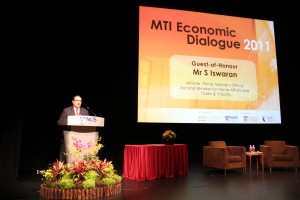
20 October 2011 was a special occasion for all students studying Economics, as it was the day the 4th Ministry of Trade and Industry (MTI) Dialogue session was held. Since its official inauguration in 2008, the MTI dialogue session has been an annual joint collaboration between the National University of Singapore (NUS) and MTI, with the aim of recognising the top economics students from the three local universities. The MTI Academic Awards, with a cash prize of $2,000, were given to the best 3rd year economics student from each university (the MTI Book Prize), as well as the student with the best 4th year economics thesis from each university (the MTI Best Thesis Award).
The event also served as a platform for students to air their views on significant economic challenges faced by Singapore today, as well as clarify government policies from an economical standpoint. The theme of this year’s dialogue was “Promoting Inclusive Growth in Singapore”, covered in the keynote speech given by Mr S Iswaran, Minister in the Prime Minister’s Office and Second Minister for Home Affairs and Trade & Industry.
“The Government has not pursued growth at all costs”, said Mr S Iswaran, stressing the point that the government’s aim has always been to build a better life for all Singaporeans, dispelling the myth that the government prioritises economic growth over the welfare of its citizens.
Citing the recent financial crisis, Mr Iswaran then went on to say that Singaporeans must be reminded that “we cannot take growth for granted”, and that existing social policies for lower income earners, including the Workfare Income Supplement (WIS) scheme, were augmented by public resources. He reiterated the point that government transfers are limited (in terms of public finances), and that for Singapore to help its citizens successfully, the government needs to “foster an environment where sustained growth is achieved within the increasingly globally competitive environment”. He concluded that growth is inclusive, in that the three economic agents, the Government, Businesses, and the Singaporean individual, are all essential and equally important to Singapore’s growth.
The session ended with the official prize presentation to the following winners-

The Best Thesis Award went to recipients whose theses were rather intriguing, to say the least. Ms Ong Eng Hui, a recent graduate from NUS, wrote a dissertation on the link between superstition (the last digit of condominium units) and condominium prices. When asked to comment, she said that there was “a very clear, defined link, based on the data, which helped my thesis go smoothly”, with one of her best takeaways being “better writing skills, after the long process.”
Ms Teo Wei Ting’s from the Singapore Management University (SMU) thesis focused on proving government expenditure spent on financing healthcare was less effective then personal expenditure spent on healthcare, a topic she was extremely interested in.
Lastly, Mr Chan Phang, Mr Ng Wei Liang and Mr Wong Heng Liang from Nanyang Technological University (NTU) collaborated on a thesis on the Penny Auction Game. They used behavioural economics to illustrate the irrationality of losers (at that game) who believed themselves as winners, even if they have lost. Mr Chan Phang remarked later that “there was further room for research regarding this topic” and that he hoped that “a budding economist would continue the work they had started.”
Three undergraduates won the MTI book prize: Mr Desmond Zheng (NUS), Mr Foo Jie Kai (SMU), and Mr Vincent Wong (NTU), with Mr Zheng jokingly commenting that he had not started his thesis, but was inspired by the winners.
The prize presentation was followed by a 40-minute dialogue session, moderated by Dr Thia Jang Ping, Director of The Economist Service ( ‘home’ of economists serving in the public sector). Students fielded questions ranging from how the government allocates its resources to the pitfalls of today’s education policies. A memorable discussion was held with regards to a hot topic amongst youth today—the foreign immigration policy—posed by a 22-year-old Economics Major from SMU.
The dialogue session ultimately concluded with a dinner-and-networking session. Students were given the opportunity to chat with the minister, as well as the other civil servants, following up from the Pre-Dialogue Career Talk by the Economist Service, which was held prior to the event.
Covered by Grace Yaw and Gedeon Lim from NUS Economics Society Publications Subcommittee
For more coverage on this event, please go here.